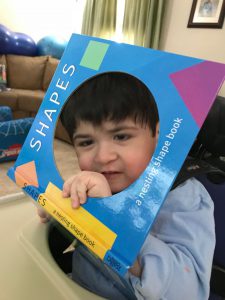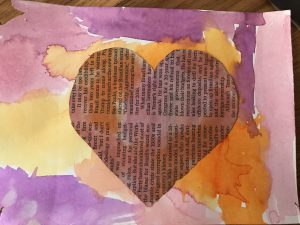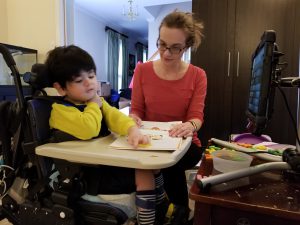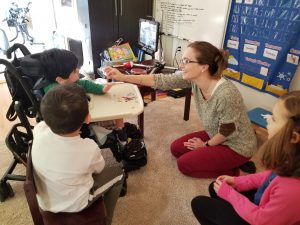 I opened the cover of the shape book, held it up to my face, and gave Joey a quick smile through the cut out circle in the cover of the book. I’m not sure why I did it, but in the moment it had seemed like a silly interaction between reading different books. Not thinking anymore about it, I placed the book on his tray and turned around to get something else. When I turned back to Joey, he was holding the book up and grinning at me through the hole, with his eyes sparkling playfully. He quickly lost his grip on the awkward book, but he worked to turn the book from side to side and try to get his head back through the hole in the cover. He giggled and laughed throughout this experience, proud of himself for copying my joke, for surprising me, and for managing to get the book up in front of his face so many times. [Read more…]
I opened the cover of the shape book, held it up to my face, and gave Joey a quick smile through the cut out circle in the cover of the book. I’m not sure why I did it, but in the moment it had seemed like a silly interaction between reading different books. Not thinking anymore about it, I placed the book on his tray and turned around to get something else. When I turned back to Joey, he was holding the book up and grinning at me through the hole, with his eyes sparkling playfully. He quickly lost his grip on the awkward book, but he worked to turn the book from side to side and try to get his head back through the hole in the cover. He giggled and laughed throughout this experience, proud of himself for copying my joke, for surprising me, and for managing to get the book up in front of his face so many times. [Read more…]
What is play, and why is it important?
This is the first in a series on play.
P lay: why it is important, how it develops, and what this means for Joey
lay: why it is important, how it develops, and what this means for Joey
Introduction
Much of what I hope to do with Joey and my work with our adapted readings is to foster his development through play. We learn about our world through play, and this play builds a foundation for our next developmental stages in life. In early childhood, play is often considered essential for creating a strong foundation for both learning and emotional regulation. [Read more…]
Increasing Gestural Communication
 One surprising aspect of Joey’s communication growth over the last year has been to watch how his overall methods of communication increased along with his use of his Alternative and Augmentative Communication (AAC) device. I often hear people fear that using an AAC device will mean that a child stops developing oral language, because he no longer has a need for it. I hear this from teachers and parents, and frankly, the first time anyone told me about an AAC device I asked the same thing. “If he can push a button and get what he wants, why on earth would he ever speak again?” “If he can talk, then why would we introduce him to a way of communicating that does not involve oral language?” [Read more…]
One surprising aspect of Joey’s communication growth over the last year has been to watch how his overall methods of communication increased along with his use of his Alternative and Augmentative Communication (AAC) device. I often hear people fear that using an AAC device will mean that a child stops developing oral language, because he no longer has a need for it. I hear this from teachers and parents, and frankly, the first time anyone told me about an AAC device I asked the same thing. “If he can push a button and get what he wants, why on earth would he ever speak again?” “If he can talk, then why would we introduce him to a way of communicating that does not involve oral language?” [Read more…]
Social Learning
 Here in Northern Virginia, we had a string of snow days a few weeks ago that kept us inside and our kids home from school. Not being one for letting something like a day home from school stop learning, this seemed like the perfect opportunity to incorporate other children into my work with Joey. In the classroom, I’ve found that so many of the routine, repetitive practices like the daily calendar lessons are powerful because children learn from their peers. Typically, Joey is not able to benefit from peer models during our one on one sessions, but Monday, with schools closed and the roads perfectly fine, it seemed like a good time to play school at Joey’s house.
Here in Northern Virginia, we had a string of snow days a few weeks ago that kept us inside and our kids home from school. Not being one for letting something like a day home from school stop learning, this seemed like the perfect opportunity to incorporate other children into my work with Joey. In the classroom, I’ve found that so many of the routine, repetitive practices like the daily calendar lessons are powerful because children learn from their peers. Typically, Joey is not able to benefit from peer models during our one on one sessions, but Monday, with schools closed and the roads perfectly fine, it seemed like a good time to play school at Joey’s house.
Choosing His Words Carefully

Joey’s eyes hovered over his device, scanning it for the words he wanted to use. He repeated some words over and over again, and each time I tried to follow up and understand what he was saying. I kept getting it wrong. I’d ask some sort of clarifying question, and he’d go back into his device to repeat the words again, putting them in a different order or adding a new word to the mix. Off. Brown. Down. Turn. Fast. Down. Black. Turn. Yet any comment I made about what he was trying to tell me was met with a head shake. Eventually, a few tears began to run down his face. Through the tears he went back into his talky, looking for new words to make himself clear. [Read more…]
- « Previous Page
- 1
- …
- 29
- 30
- 31
- 32
- 33
- …
- 38
- Next Page »


